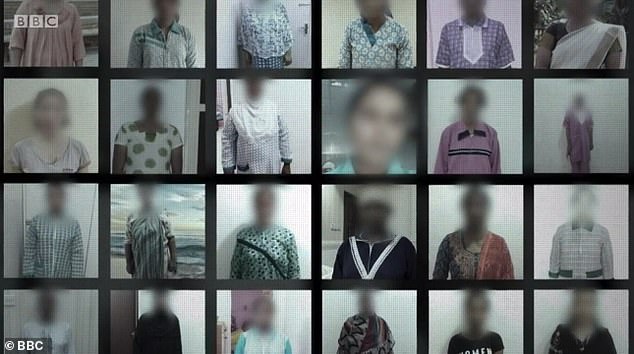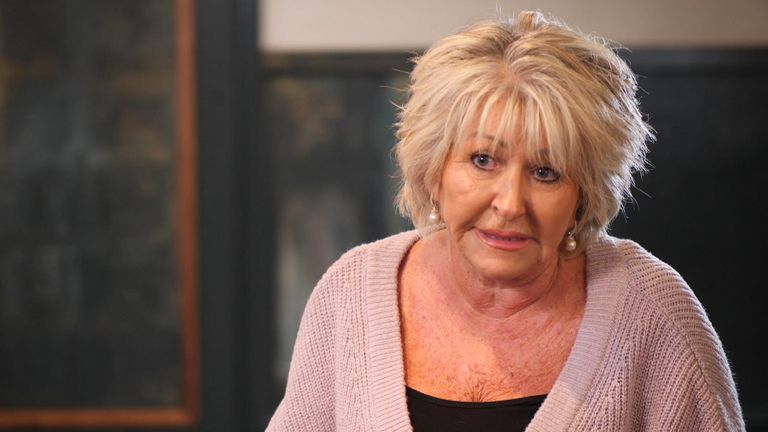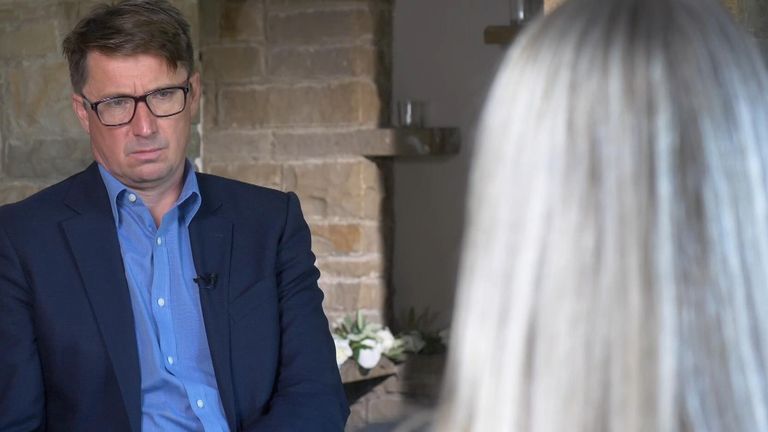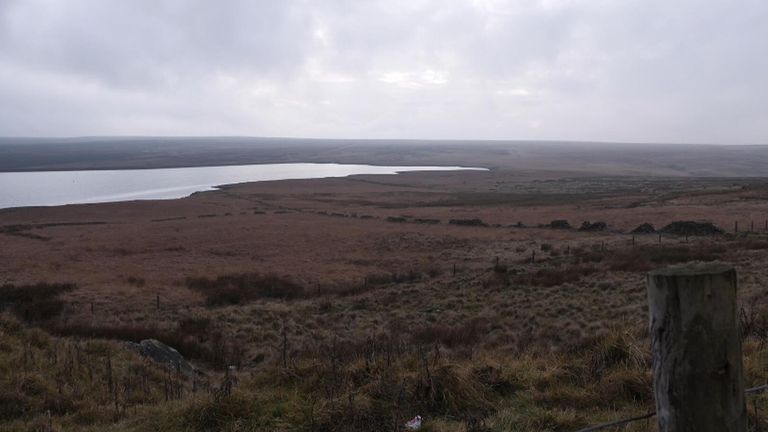Grooming gangs continue to abuse children in northern towns and police are still failing to investigate, according to alleged victims and campaigners.
Whistle-blower and former detective at Greater Manchester Police, Maggie Oliver, has told Sky News that she’s helped 2,000 victims in the last year alone who have been “fobbed off by the authorities”.
Sky News understands that the Home Office is preparing to publish a paper on predatory gangs as early as next week.
One alleged survivor of child sexual abuse has told Sky News she continues to be attacked by a gang now that she is an adult, and she was punished by them with a violent sexual assault after she gave a statement to the police about her historical abuse.
“Sarah” took us to the place where she alleges she was raped.
It’s a bleak journey. As the road snakes across barren moorland, the only break in the landscape is wind farms churning the foggy air.
She said she was abducted after speaking to the police and taken to a secluded place where she’d been abused as a child; a layby on the West Yorkshire moors.
Sarah isn’t her real name and to further protect her identity we won’t specify which Yorkshire town she is from, but she wants her story told because she fears police inaction is putting her and other women and children at risk.
She said: “They raped me first and then they said to me ‘stop speaking to the police, don’t speak to the police, why are you doing that?’ All that kind of stuff and then he hit me.
“He cut my stomach [with an old blade from a pair of scissors] and then hit me around the head.”
Sarah was allegedly abused by the gang from the age of 14, but after reporting historical and ongoing attacks she has been arrested herself numerous times for public order offences and failing to provide a breath sample.
On one occasion, after reporting being raped, she claims her finger was broken after being slammed in a police cell door.
In contrast, Sarah said none of her abusers have faced charges.
She believes West Yorkshire Police hasn’t taken the claims seriously nor acted to disrupt the gang’s activities.
Former detective, Maggie Oliver, who now runs a foundation for victims said: “The problem in this country is so monumental, that it’s far easier to pretend it’s not there.
“It’s expensive. It’s time-consuming. It’s labour-intensive.
“It’s extremely typical to criminalise the victim. To investigate a very organised gang of perhaps 20 men is very labour-intensive. It’s far easier to dismiss the victims as being drunk or as being guilty of public order offences.”
“In the past year alone,” she added, “we’ve helped more than 2,000 victims. These are all desperate victims who have been abused and are being fobbed off by the authorities.”
Former chief prosecutor in the North West, Nazir Afzal, said: “In 2015 we had the highest conviction rate for child sexual abuse in our history.
“But it’s gone backwards. It’s gone backwards because of resourcing issues, because we’ve lost experience and because agencies have just got complacent.”
Former victim of child grooming in Rotherham, Sammy Woodhouse, said: “People think the moment someone turns 18, that they are an adult and that’s it – they can all of a sudden make this stop.
“That’s completely untrue. You are going up against a gang of men that was known for raping, beating and torturing women.
“It’s very scary. Especially if the authorities are not being supportive.”
Sky News also interviewed a mother, unconnected to Sarah, who believed her child was being groomed by a member of the same gang.
She described how he allegedly gave her 14-year-old daughter alcohol and drugs and would take her on car journeys with other men.
The mother, who we will call Jane, went to the police after her daughter admitted the man had asked her for naked photographs and sent her naked pictures of himself.
Jane says the police did not ask to look at her daughter’s phone nor did they seize the man’s phone.
She added: “I made three statements in the police station and they all got lost, none of the logs got linked together, they were all allocated to different police officers.
“They’ve admitted that they’ve failed to follow all lines of inquiry and that they’d misplaced evidence.”
While child grooming isn’t confined to any ethnic group there is a concern that sensitivities over race prevented action being taken, in previous cases, as several of the gangs were men from British Pakistani origin.
Sarah’s abusers were both white and Asian. A report in Rotherham in 2014 found authorities often viewed the victims of sexual abuse as making a lifestyle choice.
Maggie Oliver believes the problem is less about the ethnicity of the abusers, and more to do with the social class of the victims.
She said: “The attitudes towards these kids are that they don’t matter.
“They are an underclass, they’re not the chief constable’s children. They’re not, you know, the prime minister’s children.
“These are children, often from very difficult backgrounds, who don’t have a voice, they are easy to dismiss, they are easy to blame.”
In Sarah’s case, after she reported her abuse, police contacted social services and her own children were placed on the child protection register over fears she was a danger to them.
David Greenwood, who specialises in legal cases involving victims of grooming gangs, said: “From the social services point of view, it’s quite disturbing to the extent that if girls have been considered as being a victim of CSE, (child sexual exploitation) social services will not tend to look at what they’re complaining about, but will tend to look at their abilities to be a parent.
“I’ve had a number of cases where girls have been targeted by social services, just by dint of having been in CSE in the past. Being considered as being unfit to look after their children.”
Assistant Chief Constable Catherine Hankinson of West Yorkshire Police said: “Tackling serious sexual offences is a top priority for West Yorkshire Police.”
With regards to Sarah’s case she added: “All reports of criminal offences made by the victim have been appropriately recorded and assessed, taking into account available evidence.
“Throughout the investigation we have liaised with CPS. A number of people have been arrested and interviewed.
“Clearly the victim is vulnerable. Wide ranging welfare support has been offered throughout and we continue to engage with the complainant to do all we can and help signpost her to further support available.
“We want victims to be reassured that we do and will treat them with the utmost sensitivity, and that their needs and welfare are paramount.”
A statement from The British Association of Social Workers said: “Social workers do not come into the job to remove children from parents or carers. They work incredibly hard to support children, adults and parents who may themselves have been victims of child sexual exploitation.
“It’s important to note social workers’ first aim is to work with families to keep them together. Where it is necessary to safeguard the welfare and best interests of the child, a legal process may follow, where it is ultimately the court’s decision to make an order or not to place a child in a local authority’s care.”
A national Child Sexual Abuse Review Panel has reinvestigated 143 historical cases and 15% of them have already resulted in conviction, which is higher than normal rape conviction rates, showing that if there’s a will and resource, cases can be successful.
Ms Oliver says attitudes have not shifted enough since the problem was first exposed.
She said: “The excuse that is always given by the authorities is that things have changed, that these are historical cases.
“If that was history, I wouldn’t be in the place I’m in today because nobody would be coming to the foundation.”
Grooming gangs continuing to abuse children in northern England, victims and campaigners warn




